Criminology: Exploring Causes, Consequences, and Responses to Crime
VerifiedAdded on 2022/08/13
|7
|1424
|56
Essay
AI Summary
This essay provides a comprehensive overview of criminology, beginning with its definition as the study of crime and criminal justice. It differentiates criminology from criminal justice, highlighting the field's roots in sociology and its evolution as a scientific discipline. The essay outlines the broad scope of criminology, encompassing the causes of crime, its impact on victims and society, and the responses to criminal behavior. It emphasizes the goals of criminological study, which include understanding the root causes of crime and developing effective means for prevention and intervention. The essay also explores the relationship between crime and social class, discussing how social structures influence the conception of crime, patterns of offending and victimization, and the criminal justice system's treatment of different populations. The role and responsibilities of a criminologist are also discussed. The essay concludes by emphasizing the importance of criminology in understanding crime as a social phenomenon and the application of research findings to improve the criminal justice system. The essay also includes relevant references.
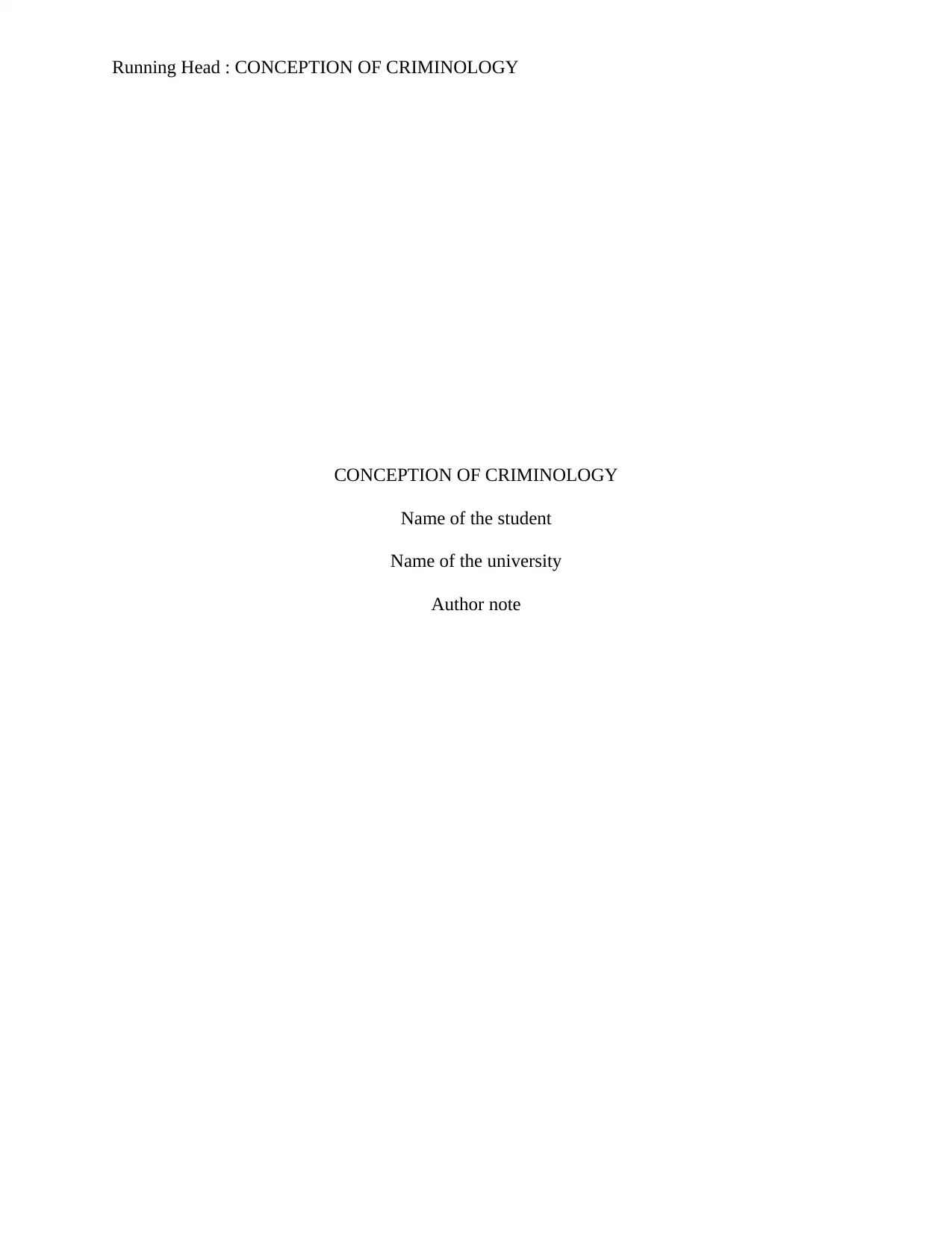
Running Head : CONCEPTION OF CRIMINOLOGY
CONCEPTION OF CRIMINOLOGY
Name of the student
Name of the university
Author note
CONCEPTION OF CRIMINOLOGY
Name of the student
Name of the university
Author note
Paraphrase This Document
Need a fresh take? Get an instant paraphrase of this document with our AI Paraphraser
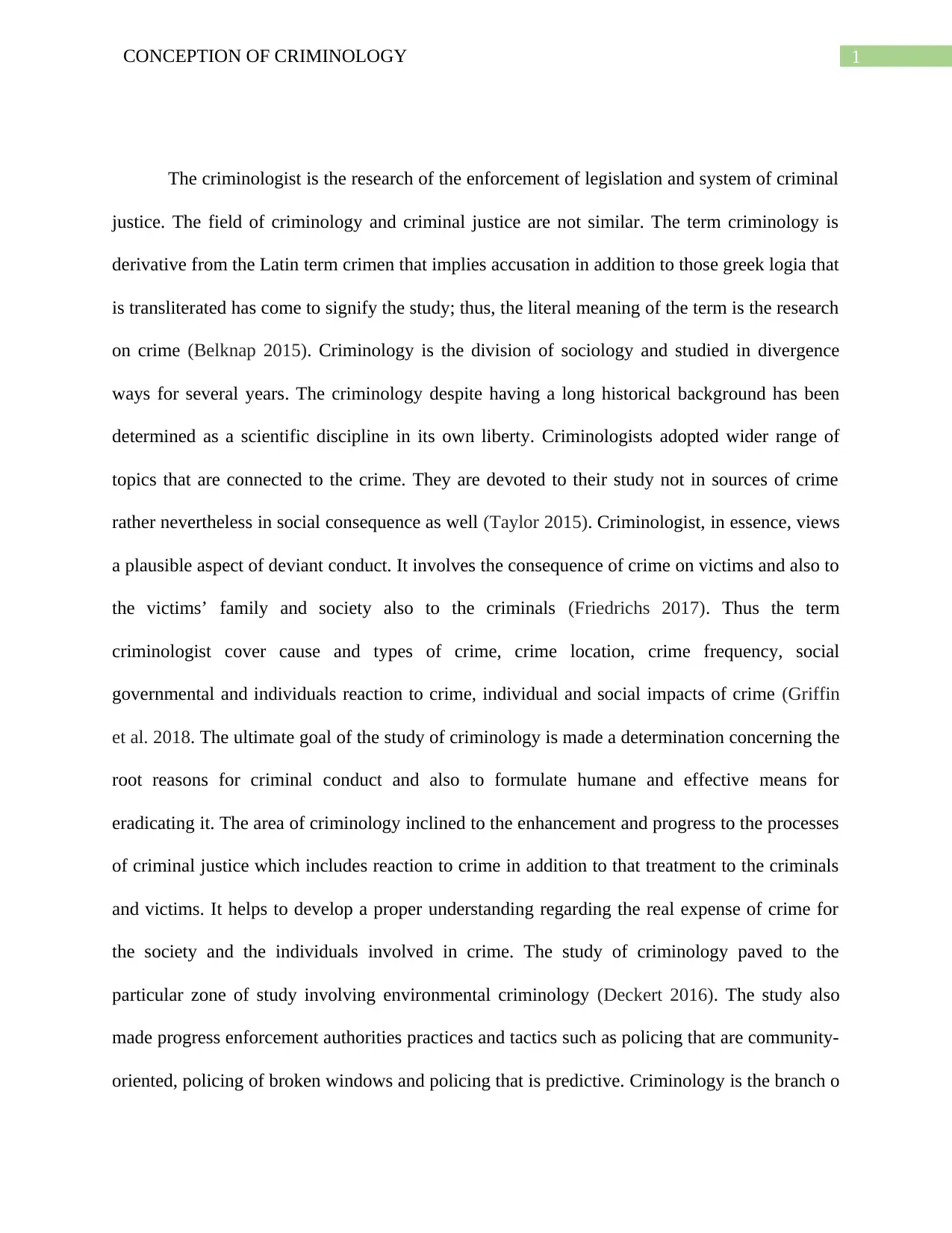
1CONCEPTION OF CRIMINOLOGY
The criminologist is the research of the enforcement of legislation and system of criminal
justice. The field of criminology and criminal justice are not similar. The term criminology is
derivative from the Latin term crimen that implies accusation in addition to those greek logia that
is transliterated has come to signify the study; thus, the literal meaning of the term is the research
on crime (Belknap 2015). Criminology is the division of sociology and studied in divergence
ways for several years. The criminology despite having a long historical background has been
determined as a scientific discipline in its own liberty. Criminologists adopted wider range of
topics that are connected to the crime. They are devoted to their study not in sources of crime
rather nevertheless in social consequence as well (Taylor 2015). Criminologist, in essence, views
a plausible aspect of deviant conduct. It involves the consequence of crime on victims and also to
the victims’ family and society also to the criminals (Friedrichs 2017). Thus the term
criminologist cover cause and types of crime, crime location, crime frequency, social
governmental and individuals reaction to crime, individual and social impacts of crime (Griffin
et al. 2018. The ultimate goal of the study of criminology is made a determination concerning the
root reasons for criminal conduct and also to formulate humane and effective means for
eradicating it. The area of criminology inclined to the enhancement and progress to the processes
of criminal justice which includes reaction to crime in addition to that treatment to the criminals
and victims. It helps to develop a proper understanding regarding the real expense of crime for
the society and the individuals involved in crime. The study of criminology paved to the
particular zone of study involving environmental criminology (Deckert 2016). The study also
made progress enforcement authorities practices and tactics such as policing that are community-
oriented, policing of broken windows and policing that is predictive. Criminology is the branch o
The criminologist is the research of the enforcement of legislation and system of criminal
justice. The field of criminology and criminal justice are not similar. The term criminology is
derivative from the Latin term crimen that implies accusation in addition to those greek logia that
is transliterated has come to signify the study; thus, the literal meaning of the term is the research
on crime (Belknap 2015). Criminology is the division of sociology and studied in divergence
ways for several years. The criminology despite having a long historical background has been
determined as a scientific discipline in its own liberty. Criminologists adopted wider range of
topics that are connected to the crime. They are devoted to their study not in sources of crime
rather nevertheless in social consequence as well (Taylor 2015). Criminologist, in essence, views
a plausible aspect of deviant conduct. It involves the consequence of crime on victims and also to
the victims’ family and society also to the criminals (Friedrichs 2017). Thus the term
criminologist cover cause and types of crime, crime location, crime frequency, social
governmental and individuals reaction to crime, individual and social impacts of crime (Griffin
et al. 2018. The ultimate goal of the study of criminology is made a determination concerning the
root reasons for criminal conduct and also to formulate humane and effective means for
eradicating it. The area of criminology inclined to the enhancement and progress to the processes
of criminal justice which includes reaction to crime in addition to that treatment to the criminals
and victims. It helps to develop a proper understanding regarding the real expense of crime for
the society and the individuals involved in crime. The study of criminology paved to the
particular zone of study involving environmental criminology (Deckert 2016). The study also
made progress enforcement authorities practices and tactics such as policing that are community-
oriented, policing of broken windows and policing that is predictive. Criminology is the branch o
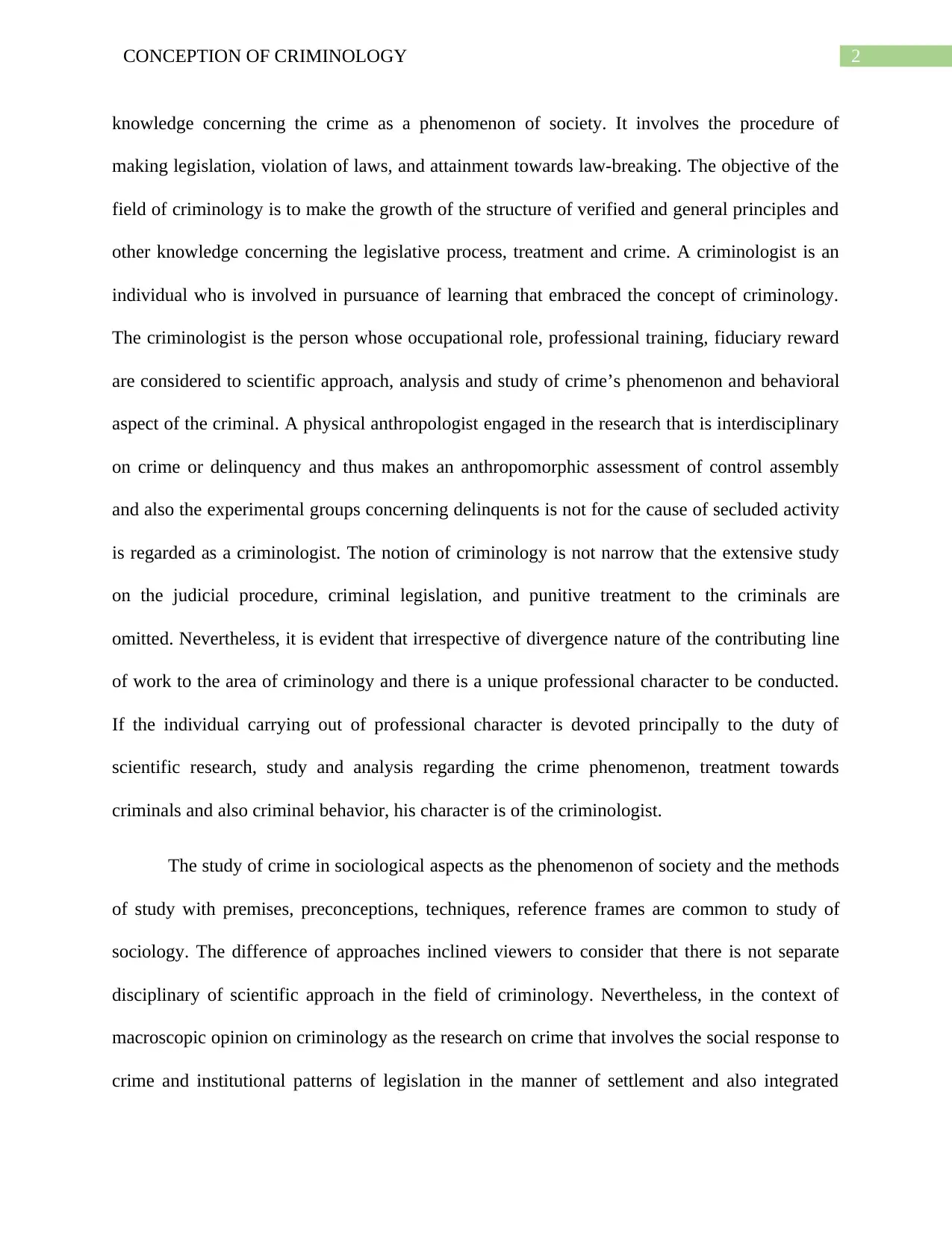
2CONCEPTION OF CRIMINOLOGY
knowledge concerning the crime as a phenomenon of society. It involves the procedure of
making legislation, violation of laws, and attainment towards law-breaking. The objective of the
field of criminology is to make the growth of the structure of verified and general principles and
other knowledge concerning the legislative process, treatment and crime. A criminologist is an
individual who is involved in pursuance of learning that embraced the concept of criminology.
The criminologist is the person whose occupational role, professional training, fiduciary reward
are considered to scientific approach, analysis and study of crime’s phenomenon and behavioral
aspect of the criminal. A physical anthropologist engaged in the research that is interdisciplinary
on crime or delinquency and thus makes an anthropomorphic assessment of control assembly
and also the experimental groups concerning delinquents is not for the cause of secluded activity
is regarded as a criminologist. The notion of criminology is not narrow that the extensive study
on the judicial procedure, criminal legislation, and punitive treatment to the criminals are
omitted. Nevertheless, it is evident that irrespective of divergence nature of the contributing line
of work to the area of criminology and there is a unique professional character to be conducted.
If the individual carrying out of professional character is devoted principally to the duty of
scientific research, study and analysis regarding the crime phenomenon, treatment towards
criminals and also criminal behavior, his character is of the criminologist.
The study of crime in sociological aspects as the phenomenon of society and the methods
of study with premises, preconceptions, techniques, reference frames are common to study of
sociology. The difference of approaches inclined viewers to consider that there is not separate
disciplinary of scientific approach in the field of criminology. Nevertheless, in the context of
macroscopic opinion on criminology as the research on crime that involves the social response to
crime and institutional patterns of legislation in the manner of settlement and also integrated
knowledge concerning the crime as a phenomenon of society. It involves the procedure of
making legislation, violation of laws, and attainment towards law-breaking. The objective of the
field of criminology is to make the growth of the structure of verified and general principles and
other knowledge concerning the legislative process, treatment and crime. A criminologist is an
individual who is involved in pursuance of learning that embraced the concept of criminology.
The criminologist is the person whose occupational role, professional training, fiduciary reward
are considered to scientific approach, analysis and study of crime’s phenomenon and behavioral
aspect of the criminal. A physical anthropologist engaged in the research that is interdisciplinary
on crime or delinquency and thus makes an anthropomorphic assessment of control assembly
and also the experimental groups concerning delinquents is not for the cause of secluded activity
is regarded as a criminologist. The notion of criminology is not narrow that the extensive study
on the judicial procedure, criminal legislation, and punitive treatment to the criminals are
omitted. Nevertheless, it is evident that irrespective of divergence nature of the contributing line
of work to the area of criminology and there is a unique professional character to be conducted.
If the individual carrying out of professional character is devoted principally to the duty of
scientific research, study and analysis regarding the crime phenomenon, treatment towards
criminals and also criminal behavior, his character is of the criminologist.
The study of crime in sociological aspects as the phenomenon of society and the methods
of study with premises, preconceptions, techniques, reference frames are common to study of
sociology. The difference of approaches inclined viewers to consider that there is not separate
disciplinary of scientific approach in the field of criminology. Nevertheless, in the context of
macroscopic opinion on criminology as the research on crime that involves the social response to
crime and institutional patterns of legislation in the manner of settlement and also integrated
⊘ This is a preview!⊘
Do you want full access?
Subscribe today to unlock all pages.

Trusted by 1+ million students worldwide
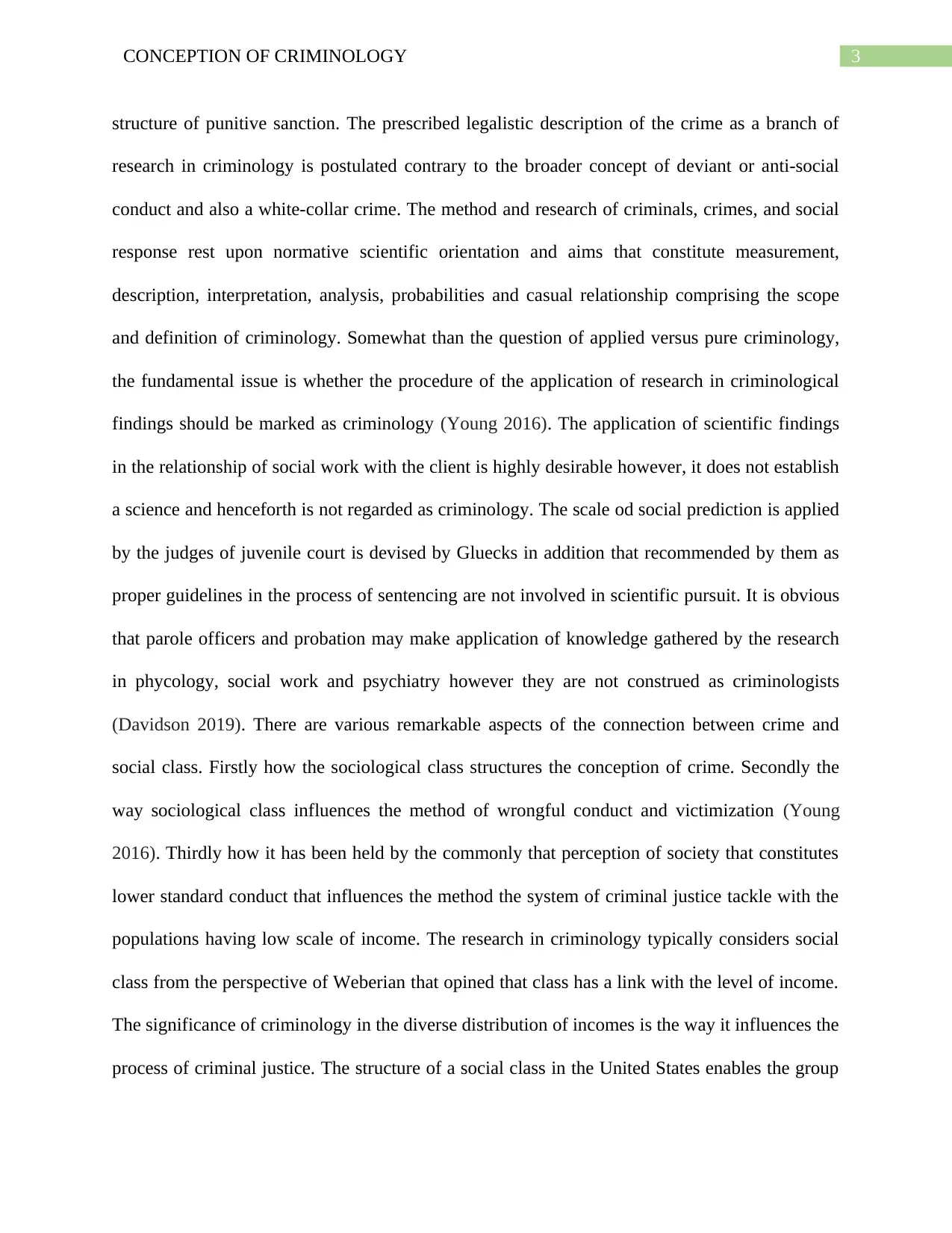
3CONCEPTION OF CRIMINOLOGY
structure of punitive sanction. The prescribed legalistic description of the crime as a branch of
research in criminology is postulated contrary to the broader concept of deviant or anti-social
conduct and also a white-collar crime. The method and research of criminals, crimes, and social
response rest upon normative scientific orientation and aims that constitute measurement,
description, interpretation, analysis, probabilities and casual relationship comprising the scope
and definition of criminology. Somewhat than the question of applied versus pure criminology,
the fundamental issue is whether the procedure of the application of research in criminological
findings should be marked as criminology (Young 2016). The application of scientific findings
in the relationship of social work with the client is highly desirable however, it does not establish
a science and henceforth is not regarded as criminology. The scale od social prediction is applied
by the judges of juvenile court is devised by Gluecks in addition that recommended by them as
proper guidelines in the process of sentencing are not involved in scientific pursuit. It is obvious
that parole officers and probation may make application of knowledge gathered by the research
in phycology, social work and psychiatry however they are not construed as criminologists
(Davidson 2019). There are various remarkable aspects of the connection between crime and
social class. Firstly how the sociological class structures the conception of crime. Secondly the
way sociological class influences the method of wrongful conduct and victimization (Young
2016). Thirdly how it has been held by the commonly that perception of society that constitutes
lower standard conduct that influences the method the system of criminal justice tackle with the
populations having low scale of income. The research in criminology typically considers social
class from the perspective of Weberian that opined that class has a link with the level of income.
The significance of criminology in the diverse distribution of incomes is the way it influences the
process of criminal justice. The structure of a social class in the United States enables the group
structure of punitive sanction. The prescribed legalistic description of the crime as a branch of
research in criminology is postulated contrary to the broader concept of deviant or anti-social
conduct and also a white-collar crime. The method and research of criminals, crimes, and social
response rest upon normative scientific orientation and aims that constitute measurement,
description, interpretation, analysis, probabilities and casual relationship comprising the scope
and definition of criminology. Somewhat than the question of applied versus pure criminology,
the fundamental issue is whether the procedure of the application of research in criminological
findings should be marked as criminology (Young 2016). The application of scientific findings
in the relationship of social work with the client is highly desirable however, it does not establish
a science and henceforth is not regarded as criminology. The scale od social prediction is applied
by the judges of juvenile court is devised by Gluecks in addition that recommended by them as
proper guidelines in the process of sentencing are not involved in scientific pursuit. It is obvious
that parole officers and probation may make application of knowledge gathered by the research
in phycology, social work and psychiatry however they are not construed as criminologists
(Davidson 2019). There are various remarkable aspects of the connection between crime and
social class. Firstly how the sociological class structures the conception of crime. Secondly the
way sociological class influences the method of wrongful conduct and victimization (Young
2016). Thirdly how it has been held by the commonly that perception of society that constitutes
lower standard conduct that influences the method the system of criminal justice tackle with the
populations having low scale of income. The research in criminology typically considers social
class from the perspective of Weberian that opined that class has a link with the level of income.
The significance of criminology in the diverse distribution of incomes is the way it influences the
process of criminal justice. The structure of a social class in the United States enables the group
Paraphrase This Document
Need a fresh take? Get an instant paraphrase of this document with our AI Paraphraser
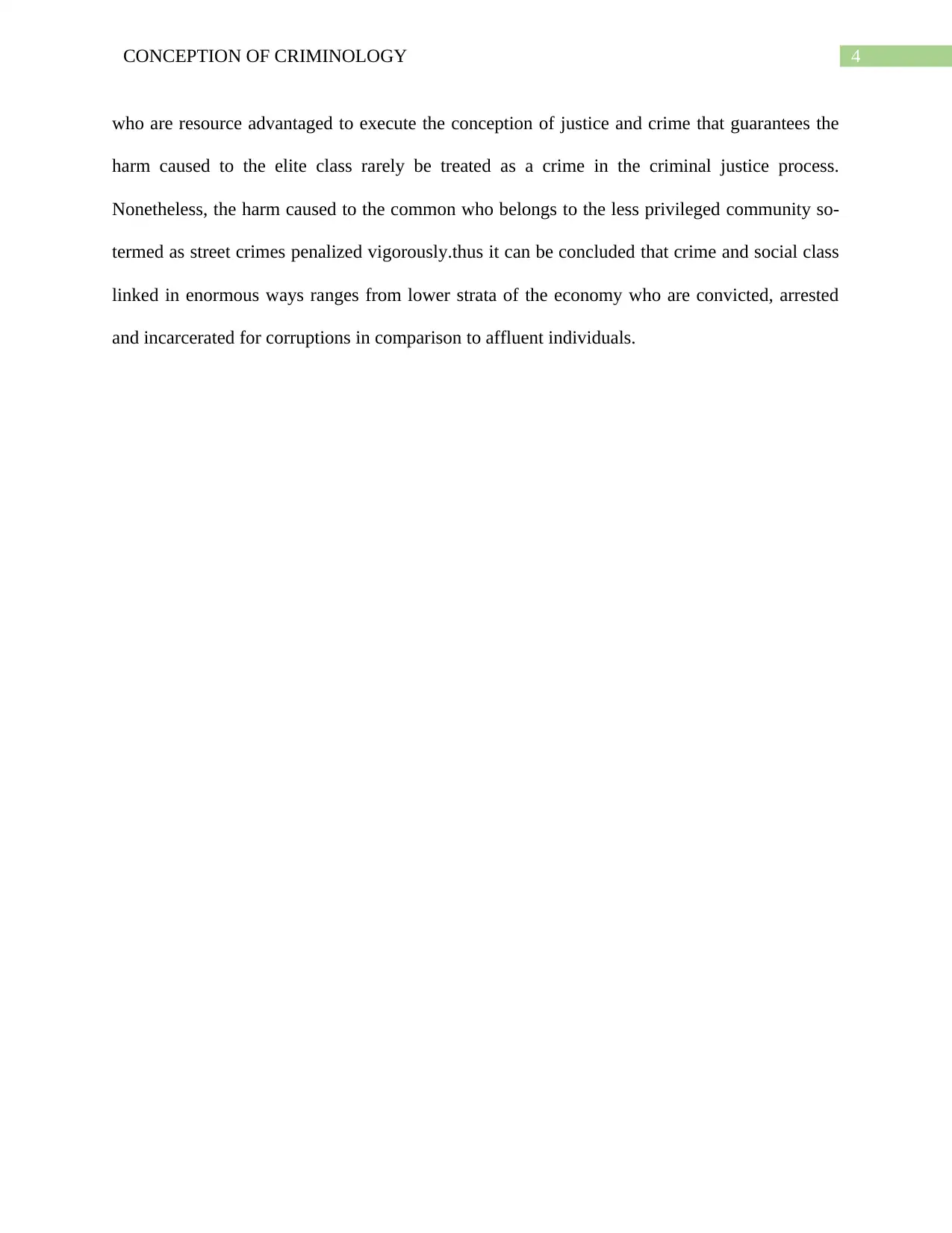
4CONCEPTION OF CRIMINOLOGY
who are resource advantaged to execute the conception of justice and crime that guarantees the
harm caused to the elite class rarely be treated as a crime in the criminal justice process.
Nonetheless, the harm caused to the common who belongs to the less privileged community so-
termed as street crimes penalized vigorously.thus it can be concluded that crime and social class
linked in enormous ways ranges from lower strata of the economy who are convicted, arrested
and incarcerated for corruptions in comparison to affluent individuals.
who are resource advantaged to execute the conception of justice and crime that guarantees the
harm caused to the elite class rarely be treated as a crime in the criminal justice process.
Nonetheless, the harm caused to the common who belongs to the less privileged community so-
termed as street crimes penalized vigorously.thus it can be concluded that crime and social class
linked in enormous ways ranges from lower strata of the economy who are convicted, arrested
and incarcerated for corruptions in comparison to affluent individuals.
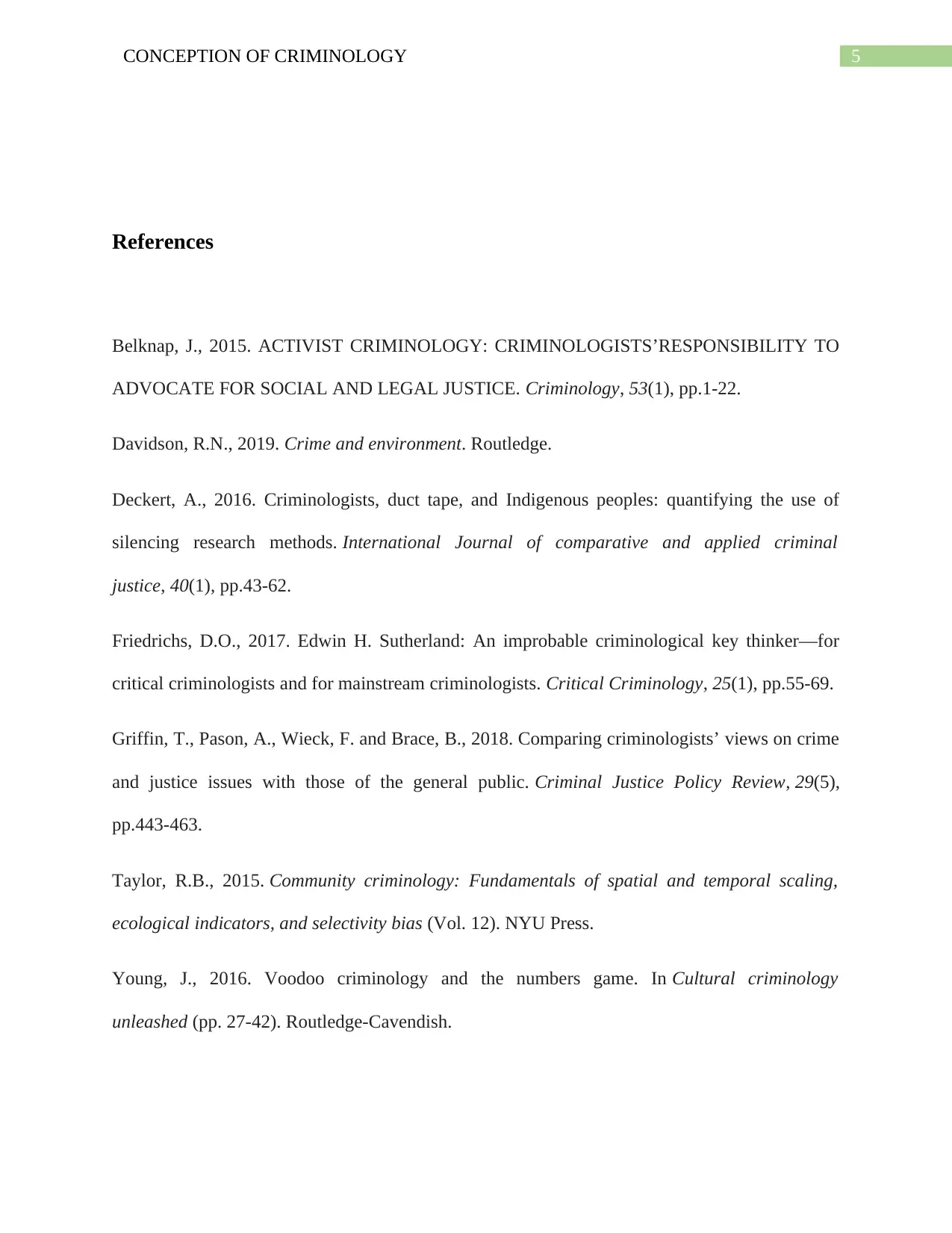
5CONCEPTION OF CRIMINOLOGY
References
Belknap, J., 2015. ACTIVIST CRIMINOLOGY: CRIMINOLOGISTS’RESPONSIBILITY TO
ADVOCATE FOR SOCIAL AND LEGAL JUSTICE. Criminology, 53(1), pp.1-22.
Davidson, R.N., 2019. Crime and environment. Routledge.
Deckert, A., 2016. Criminologists, duct tape, and Indigenous peoples: quantifying the use of
silencing research methods. International Journal of comparative and applied criminal
justice, 40(1), pp.43-62.
Friedrichs, D.O., 2017. Edwin H. Sutherland: An improbable criminological key thinker—for
critical criminologists and for mainstream criminologists. Critical Criminology, 25(1), pp.55-69.
Griffin, T., Pason, A., Wieck, F. and Brace, B., 2018. Comparing criminologists’ views on crime
and justice issues with those of the general public. Criminal Justice Policy Review, 29(5),
pp.443-463.
Taylor, R.B., 2015. Community criminology: Fundamentals of spatial and temporal scaling,
ecological indicators, and selectivity bias (Vol. 12). NYU Press.
Young, J., 2016. Voodoo criminology and the numbers game. In Cultural criminology
unleashed (pp. 27-42). Routledge-Cavendish.
References
Belknap, J., 2015. ACTIVIST CRIMINOLOGY: CRIMINOLOGISTS’RESPONSIBILITY TO
ADVOCATE FOR SOCIAL AND LEGAL JUSTICE. Criminology, 53(1), pp.1-22.
Davidson, R.N., 2019. Crime and environment. Routledge.
Deckert, A., 2016. Criminologists, duct tape, and Indigenous peoples: quantifying the use of
silencing research methods. International Journal of comparative and applied criminal
justice, 40(1), pp.43-62.
Friedrichs, D.O., 2017. Edwin H. Sutherland: An improbable criminological key thinker—for
critical criminologists and for mainstream criminologists. Critical Criminology, 25(1), pp.55-69.
Griffin, T., Pason, A., Wieck, F. and Brace, B., 2018. Comparing criminologists’ views on crime
and justice issues with those of the general public. Criminal Justice Policy Review, 29(5),
pp.443-463.
Taylor, R.B., 2015. Community criminology: Fundamentals of spatial and temporal scaling,
ecological indicators, and selectivity bias (Vol. 12). NYU Press.
Young, J., 2016. Voodoo criminology and the numbers game. In Cultural criminology
unleashed (pp. 27-42). Routledge-Cavendish.
⊘ This is a preview!⊘
Do you want full access?
Subscribe today to unlock all pages.

Trusted by 1+ million students worldwide
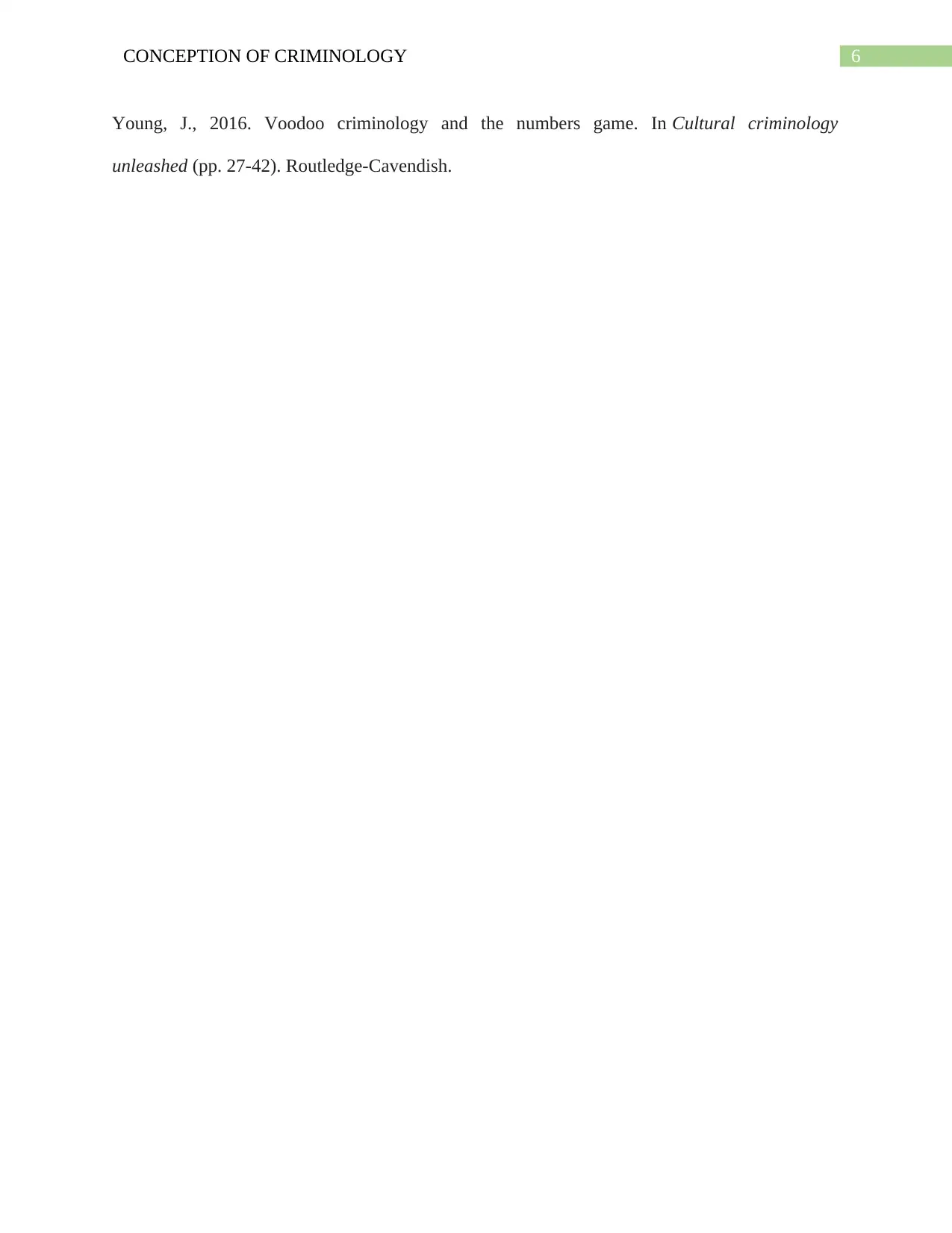
6CONCEPTION OF CRIMINOLOGY
Young, J., 2016. Voodoo criminology and the numbers game. In Cultural criminology
unleashed (pp. 27-42). Routledge-Cavendish.
Young, J., 2016. Voodoo criminology and the numbers game. In Cultural criminology
unleashed (pp. 27-42). Routledge-Cavendish.
1 out of 7
Related Documents
Your All-in-One AI-Powered Toolkit for Academic Success.
+13062052269
info@desklib.com
Available 24*7 on WhatsApp / Email
![[object Object]](/_next/static/media/star-bottom.7253800d.svg)
Unlock your academic potential
Copyright © 2020–2026 A2Z Services. All Rights Reserved. Developed and managed by ZUCOL.





